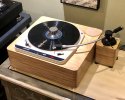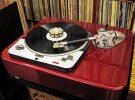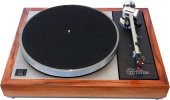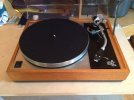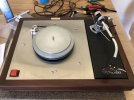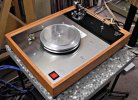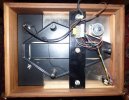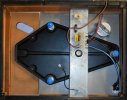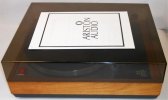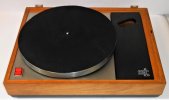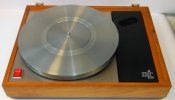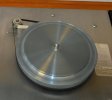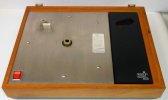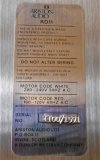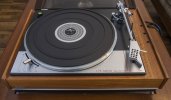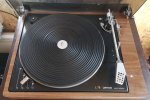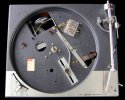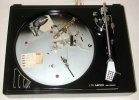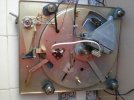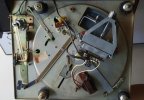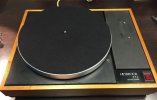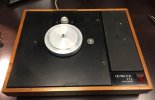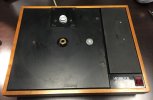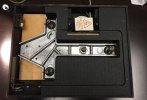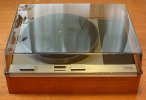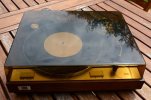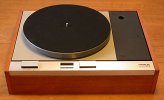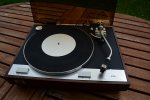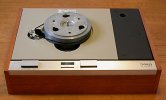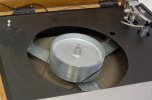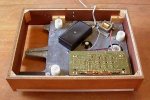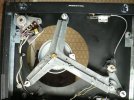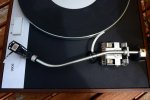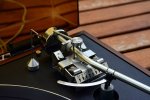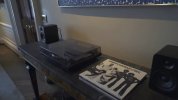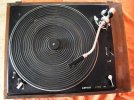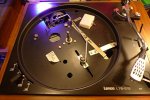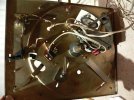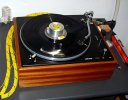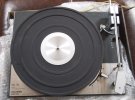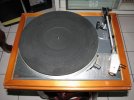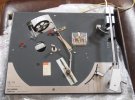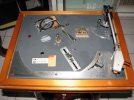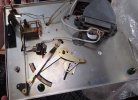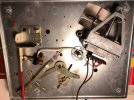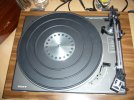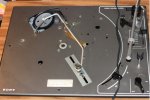Many record enthusiasts prefer to use idler drive turntables, even in these modern times. The idler design concept is ancient and considered obsolete as these turntables are considered noisy and the condition of the rubber idler wheel is usually a key dependency. An erratic or worn idler wheel can result in change in pitch, wow and flutter and reduced torque in these turntables and for changers, the deck will slow down when the auto-mechanism kicks in or the auto mechanism may fail all together as the platter will not have enough torque for moving the levers.
Idler drive turntables, however have their signature sound (referred to as bass slam, bass attack, low frequency timing, etc among others). The reasons behind this unique sound, is explained
here.
So you want to get into idler turntables but are on a budget or maybe you want to sample the sound before you scale up the investment. You may want to consider one these faithful little Idler transcription turntables from the mid 1960s.
Garrard SP25 Mk1 vs Dual 1019
Many may know the Garrard 301 and 401 but not too many remember the SP25 series. The SP25 series commenced production in 1965 and was Garrard's answer to the necessity for a high quality single record player for the mass market. This 4-speed deck went on to become Garrard's highest selling decks ever and they had a long production run through 4 series (mk1 to mk4), the mk4 launch was in 1974. The MK1 and MK2 were semi-automatic designs with tonearm lift and return, whereas the Mk3 and Mk4 were fully automatic designs. These decks were rugged and could take abuse on the road, the tonearms were decent and could track at VTFs as low as 1 gram. A popular cartridge paired with this series was the Shure M76-6s and this added to the great sounds. The Garrard SP25 has a place of honour among idler-drive enthusiasts and particularly Lenco enthusiasts. Jean Nantais, who popularized the whole Lenco revival, first heard the “idler-drive sound” on an SP25 and couldn’t believe how this little turntable surpassed high-end belt-drive turntables that he had owned and heard (Linn LP-12 included). He was greatly surprised by the vastly superior bass slam, overall slam and also its quite gifted ability, in terms of information retrieval. Incidentally the SP25 MK1 is the most desirable version of this series. Another piece of trivia about the Garrard SP25 Mk1 is it was a favourite with Jamaican sound system DJs. In Jamaican popular culture, a sound system is a group of disc jockeys, engineers and MCs playing ska, rocksteady or reggae music. The sound system is an important part of Jamaican culture and history. More details on the Jamaican Sound System can be
checked out here.
The Dual 1019 turntable also hit the market in 1965 and is a fully automatic, idler driven turntable (unlike the semi-automatic SP25). In fact, it is popular amongst the 78 community due to its high torque motor and heavy 7.5 pound platter. The automatic start/stop system is pretty complex and is completely mechanical. Like the Garrard SP25s, this one comes with a 10 inch platter. The Dual has a very reliable friction free dynamically balanced tonearm with direct dial continuously variable anti-skating compensation, cue and pitch control and elastically damped counterbalance with rapid and fine adjust. The arm tube is thick and rigid and can track as low as 1/2 gram. The tonearm performance is better than the Garrard SP25. For me, where the Dual scores over the Garrard is in the looks department. If you get one in good cosmetic condition, and when mounted in a teak finish wood plinth, it is a true stunner.
Here is a visual comparison - Garrard SP25 Mk1 (on the left) and Dual 1019 (on the right)
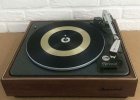
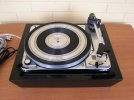
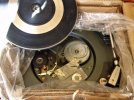
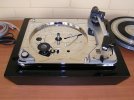
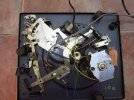
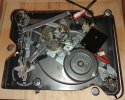
Note: These are stock pictures hence cosmetic condition may vary.
The Dual may be hard to find in India but does come up once in a while on olx.in. However these are available in abundance on eBay Germany. The SP25 Mk2 and Mk3 are easier to find on eBay UK but the SP25 Mk1 does come up once in a while. I suggest never to buy the Dual in India, once the auto mech gives trouble, it is very hard to calibrate it. One common issue with these turntables is dried grease and oil, although the Garrard requires minimal amounts of these. It would be better to do a complete cleaning and lube job on either of them them before normal play.
My Personal Opinion: The Dual is a mechanically and spec-wise superior deck but has a complex auto-mechanism. The build quality of both turntables is great, both are built like Tanks but I feel the Garrard's tonearm is a little more accurate and nimble. The Dual is cosmetically more appealing and has a great fan following. I have grown up listening to the Garrard SP25 Mk1 and I can say for sure that it is a great sounding deck. With it mounted to a proper plinth, one can enjoy the classic idler sound for about 50 GBP.


